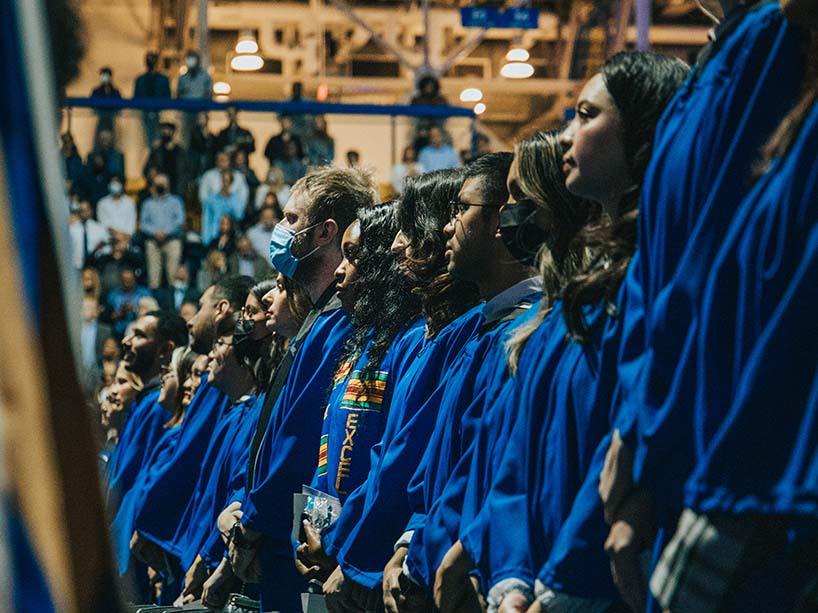Black and Indigenous students wear special stoles at convocation

Carianne Shakes, who graduated on Friday, June 17, wore the Kente Stole because she felt it not only celebrated her identity but also acknowledged the focus of much of her studies and passions on campus. Photo courtesy of Carianne Shakes
This year at convocation, Indigenous and Black students could choose to cross the stage to receive their degree wearing a stole that celebrates their identity and achievements. For Indigenous students, this is the first time these stoles have been available to wear for convocation.
Kente stoles
Carianne Shakes (Creative Industries ’22), chose to wear the stole designed for graduating Black students as she crossed the stage to collect her degree.
“All the academic work I've done has been focused on exploring Black people, Black culture and Black life. So it felt like an opportunity for me to celebrate that; it wasn’t just about myself but also wanting to honour a lot of the work that I've been doing and the stuff that I'm passionate about.”
Shakes says a special part of her time at TMU centred around the mentorship she received from professor Cheryl Thompson, who taught her in the Creative Industries program in The Creative School before making the switch to the School of Performance. “I worked as a research assistant under her through the TMU Undergraduate Research Opportunity (URO) on “Black Minstrelsy on Canadian Stages: Nostalgia for Plantation Slavery in the Nineteenth and Twentieth Centuries (external link) ,” a project exploring the history of blackface in Canada,” she says. “Having another Black woman recognize me and take me under her wing within the program, meant a lot. She used her position in such a meaningful way that really shaped my years at the school and made it worthwhile for me in a way that I didn't even think was possible.”

We hosted 8,900 grads at 20 ceremonies this month - an increase from the 5,800 grads at 12 ceremonies in 2019.
The stoles were adapted from African tradition in Ghana, says Jennifer Barcelona, manager in the Tri-Mentoring Program in Student Affairs. “The woven cloth (which was once only worn by royalty) is a scarf-like garment worn over the shoulders. Similar to standard graduation stoles, they typically represent some type of accomplishment, graduation or other rites of passage."
The university purchased the Kente stoles, which were woven in Ghana, from Sankofa Stoles (external link) - a company owned by TMU alumni.
Indigenous stoles
Alexxus Leigh Newman (English Language and Literatures ’22), said the Indigenous stoles recognize a new chapter of the university as TMU, noting that it may have been difficult in the past for Indigenous students to celebrate the identity of the university.

Alexxus Leigh Newman sees the Indigenous stoles as a way for the university to acknowledge its next chapter in reconciliation.
The stoles give students a chance to celebrate who they are and also what they’ve achieved, Newman says.
The discussion around having stoles available for Indigenous students to wear as they cross the Convocation stage has been underway for some time, says Brian Norton, program manager, Aboriginal Student Services. “The design of the stoles was a collaboration between Aboriginal Student Services and the Ceremonials office. The feather represents an eagle feather, which can have several meanings: it can represent knowledge, wisdom, hard work and humility, which in this instance is something that every Indigenous graduate can appreciate.”





